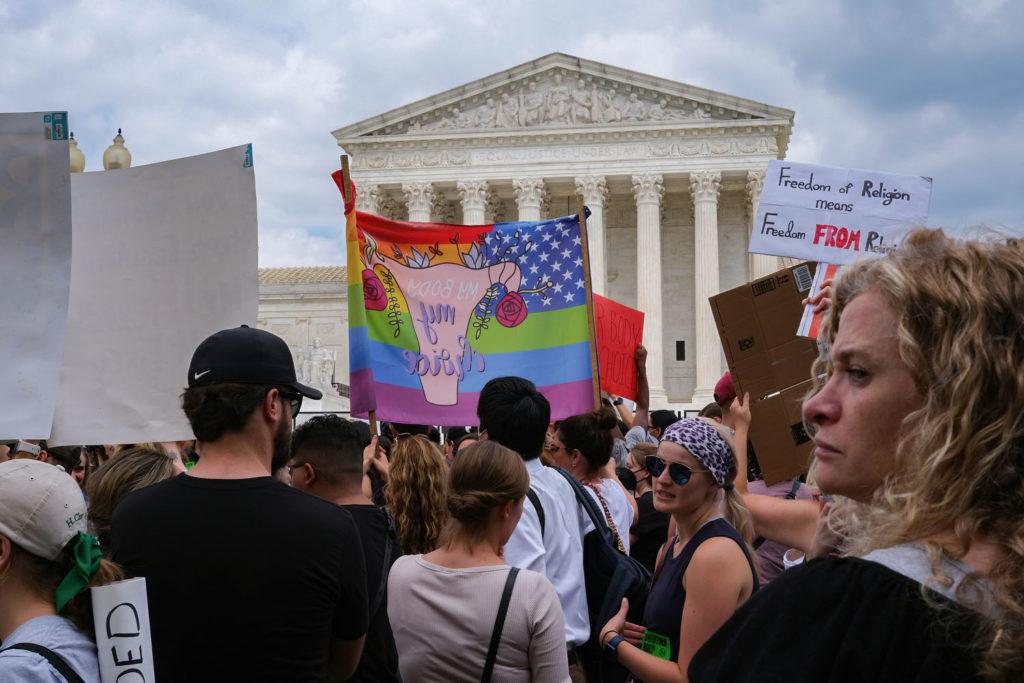Thousands of people rallied to protest the Supreme Court’s 6-3 decision to overturn Roe v. Wade this weekend, a ruling that ends federal abortion protections and will usher in a new era of reproductive rights rollbacks.
Crowds built up outside the courthouse ahead of the 10:10 a.m. release of the landmark decision Friday before surging past at least three thousand people later in the afternoon and into Saturday. Protesters demanded that the federal government find alternate ways to protect abortion and bashed the decision in Dobbs v. Jackson Women’s Health Organization, which leaves the right to an abortion up to the states, as an attack on human rights and a disregard for public will.
Last month, POLITICO published a leaked draft opinion to strike down Roe v. Wade, sparking a crowd of around 500 people to protest at the Supreme Court that night. Students continued to protest at the court in the following week and student organizations like Swing Left GW condemned the draft opinion on social media and encouraged students to vote for pro-choice candidates.
Laurel Downie, a protester at the court, said poor women and women of color are disadvantaged by the decision because women of privilege will always have access to abortion regardless of the Supreme Court decision.
“This decision is putting women who are poor, women who are marginalized, in potentially lethal situations without their consent,” Downie said.
She said the Supreme Court is “outdated” and should not have life-long tenure because it had already established a stance on abortion when they were installed.
During their confirmation hearings, all six Supreme Court justices who voted to overturn Roe v. Wade said they viewed the case’s ruling and subsequent Planned Parenthood v. Casey decision, which reaffirmed Roe, as precedent.
Downie said abortion-rights organizers should focus on organizing locally because much of abortion-rights organizing is aimed toward the federal government and less attention is given to municipal governments. She said Washington, D.C. should be able to make its own decisions and be a “safe haven” for women who need healthcare.
Renee Bracey Sherman, a protester at the court and founder and executive director of We Testify, a national organization representing people that have had abortions, said the Court’s decision is “horrifying” and will restrict the rights to healthcare across the country.
Associate Justice Samuel Alito wrote the majority opinion and stated that decisions pertaining to abortion protections should be left up to elected officials.
Associate Justices Stephen Breyer, Elena Kagan and Sonia Sotomayor wrote the dissenting opinion and stated that women should be respected as an “autonomous being” and be able to have an abortion if they choose.
Bracey Sherman said restricted abortion access is a public health emergency, and people should share their abortion stories and donate to clinics who provide abortions.
“Don’t try and recreate the wheel,” Bracey Sherman said. “Show up where folks have been organizing and just ask how you can get involved.”
Norah McCormick, who is seven months pregnant with her first child, said she has a “high degree of empathy” for how financially, physically and mentally taxing the process can be and would “never force pregnancy or birth” on anyone who didn’t want it.
She said she is having a boy and hopes he will advocate for justice, despite not being born into a world where Roe v. Wade is still considered constitutional by the Supreme Court.
“My mother had more rights than I do,” McCormick said. “It’s unbelievable that I’ll have known Roe in my lifetime but my son may not. I hope to teach him some of the values that were instilled in me, and I hope he’ll fight for justice.”
She said she attended March for Women’s Lives in 2004, which shaped her current view that people should have a right to choose to have an abortion.
“We were out here marching for a right that we already had,” McCormick said. “To see that stripped away today again, for millions of women, I just thought I can’t stay at home and be silent and be sad. I have to come out and continue to stand up for what I believe in.”
Kate Hoeting, the managing editor of Catholics for Choice, said fellow protesters who saw her Catholic organization’s abortion-rights signs were surprised and emotional, with some even breaking down into tears.
“The moment of people literally just seeing those three words ‘Catholics for Choice’ bursting into tears just so much shows how many people of faith are really vocal and supportive of abortion access, and they can feel like they’re alone. So we’re here to say, ‘you’re not alone’ and it’s time to speak up.”
The crowd drew shouting matches between protesters and counter-protesters, who celebrated the Court’s decision to overturn Roe v. Wade, and more than a hundred Capitol police officers were present at the protest. The Metropolitan Police Department was also fully deployed.
Waleed Haider, a protester at the court, said he decided to protest to remind Americans to consider the Islamic belief that a woman has control over her fetus and her body. He said both Muslims and non-Muslims need to come together to give women the basic right to an abortion.
“We have to protect it from the Supreme Court which has been attacking women’s rights as we’ve seen with this decision today,” Haider said.
Danielle Towers, Erika Filter and Zach Blackburn contributed reporting.








